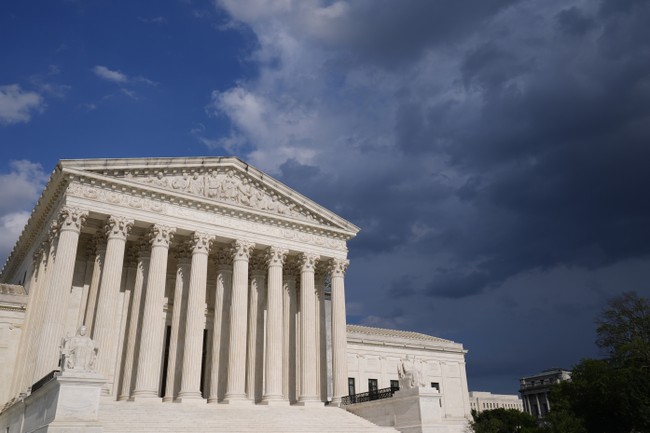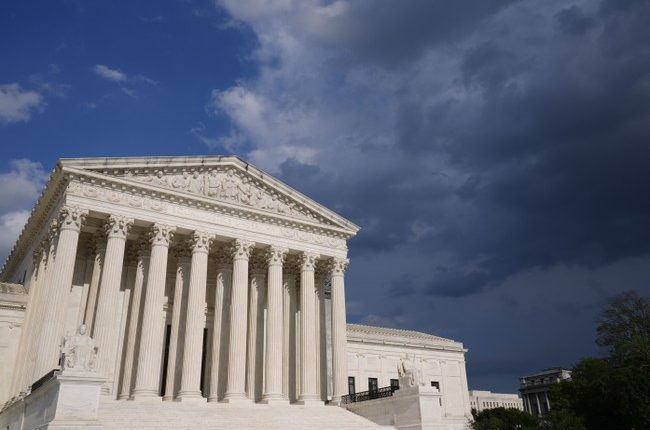
The Supreme Court today issued a brief order today which partly sides with a lower court’s order that the Trump administration must “facilitate” the return of an illegal immigrant living in Maryland who was deported to a prison in El Salvador last month. However there are some quibbles about the wording of the lower court’s order and also about the timing.
We’ll get to those issues in a moment but first, here’s the backstory of this one which is important for making sense of the case.
On March 15, 2025, the United States removed Kilmar Armando Abrego Garcia from the United States to El Salvador, where he is currently detained in the Center for Terrorism Confinement (CECOT). The United States acknowledges that Abrego Garcia was subject to a withholding order forbidding his removal to El Salvador, and that the removal to El Salvador was therefore illegal. The United States represents that the removal to El Salvador was the result of an “administrative error.” The United States alleges, however, that Abrego Garcia has been found to be a member of the gang MS–13, a designated foreign terrorist organization, and that his return to the United States would pose a threat to the public. Abrego Garcia responds that he is not a member of MS–13, and that he has lived safely in the United States with his family for a decade and has never been charged with a crime.
On Friday, April 4, the United States District Court for the District of Maryland entered an order directing the Government to “facilitate and effectuate the return of [Abrego Garcia] to the United States by no later than 11:59 PM on Monday, April 7.”
So the government says this was a clerical error. Because Abrego Garcia had claimed persecution in El Salvador (where he is from) we should not have deported him to that country. However, on the morning of April 7 (Monday of this week), just hours before the deadline for effectuating his return, the Trump administration asked the Supreme Court to intervene. Chief Justice Roberts did so and stayed the deadline so SCOTUS could consider the case.
In today’s brief decision on the issue, the Justices note that since the deadline is passed by several days that part of the order is effectively granted. The deadline no longer exists.
The application is granted in part and denied in part, subject to the direction of this order. Due to the administrative stay issued by THE CHIEF JUSTICE, the deadline imposed by the District Court has now passed. To that extent, the Government’s emergency application is effectively granted in part and the deadline in the challenged order is no longer effective.
As for the rest of it, the order was a mixed bag. The Justices mostly side with the lower court however they also question the use of the word “effectuate” suggesting that went too far.
The rest of the District Court’s order remains in effect but requires clarification on remand. The order properly requires the Government to “facilitate” Abrego Garcia’s release from custody in El Salvador and to ensure that his case is handled as it would have been had he not been improperly sent to El Salvador. The intended scope of the term “effectuate” in the District Court’s order is, however, unclear, and may exceed the District Court’s authority. The District Court should clarify its directive, with due regard for the deference owed to the Executive Branch in the conduct of foreign affairs. For its part, the Government should be prepared to share what it can concerning the steps it has taken and the prospect of further steps.
So what does this mean in practice?
The decision means the administration does not immediately have to try to return Abrego Garcia to the United States because a judge-imposed deadline has already expired but “should be prepared to share what it can concerning the steps it has taken and the prospect of further steps,” the unsigned decision said.
They probably have to do something about getting him out or at least show a good reason why they aren’t willing to do so. He may have to be returned to the US at some point.
In any case, the order ends with a mini-dissent from the court’s three liberals. [I’ve removed some of the citations for readability.]
Statement of JUSTICE SOTOMAYOR, with whom J USTICE KAGAN and JUSTICE JACKSON join, respecting the Court’s disposition of the application.
The United States Government arrested Kilmar Armando Abrego Garcia in Maryland and flew him to a “terrorism confinement center” in El Salvador, where he has been detained for 26 days and counting. To this day, the Government has cited no basis in law for Abrego Garcia’s warrantless arrest, his removal to El Salvador, or his confinement in a Salvadoran prison. Nor could it. The Government remains bound by an Immigration Judge’s 2019 order expressly prohibiting Abrego Garcia’s removal to El Salvador because he faced a “clear probability of future persecution” there and “demonstrated that [El Salvador’s] authorities were and would be unable or unwilling to protect him.” The Government has not challenged the validity of that order.
Instead of hastening to correct its egregious error, the Government dismissed it as an “oversight.” The Government now requests an order from this Court permitting it to leave Abrego Garcia, a husband and father without a criminal record, in a Salvadoran prison for no reason recognized by the law. The only argument the Government offers in support of its request, that United States courts cannot grant relief once a deportee crosses the border, is plainly wrong. The Government’s argument, moreover, implies that it could deport and incarcerate any person, including U. S. citizens, without legal con-sequence, so long as it does so before a court can intervene. That view refutes itself.
Because every factor governing requests for equitable relief manifestly weighs against the Government, I would have declined to intervene in this litigation and denied the application in full.
Nevertheless, I agree with the Court’s order that the proper remedy is to provide Abrego Garcia with all the process to which he would have been entitled had he not been unlawfully removed to El Salvador. That means the Government must comply with its obligation to provide Abrego Garcia with “due process of law,” including notice and an opportunity to be heard, in any future proceedings. It must also comply with its obligations under the Convention Against Torture. See Convention Against Torture and Other Cruel and Inhuman Degrading Treatment or Punishment, Dec. 10, 1984, S.Treaty Doc. No. 100–20, 1465 U. N. T. S. 113. Federal law governing detention and removal of immigrants continues, of course, to be binding as well. See 8 U. S. C. §1226(a) (requiring a warrant before a noncitizen “may be arrested and detained pending a decision” on removal); 8 CFR§287.8(c)(2)(ii) (2024) (requiring same); see also 8 CFR§241.4(l) (in order to revoke conditional release, the Government must provide adequate notice and “promptly” arrange an “initial informal interview . . . to afford the alien an opportunity to respond to the reasons for the revocation stated in the notification”). Moreover, it has been the Government’s own well-established policy to “facilitate [an] alien’s return to the United States if . . . the alien’s presence is necessary for continued administrative removal proceedings” in cases where a noncitizen has been removed pending immigration proceedings. See U. S. Immigration and Customs Enforcement, Directive 11061.1, Facilitating the Re-turn to the United States of Certain Lawfully Removed Aliens, §2 (Feb. 24, 2012).
In the proceedings on remand, the District Court should continue to ensure that the Government lives up to its obligations to follow the law.
In short, the liberals are giving a knock on Chief Justice Roberts for involving himself in this and all but demanding the lower court find a way to bring this guy back. That’s probably what the court will do, though it will have to ask nicely.








